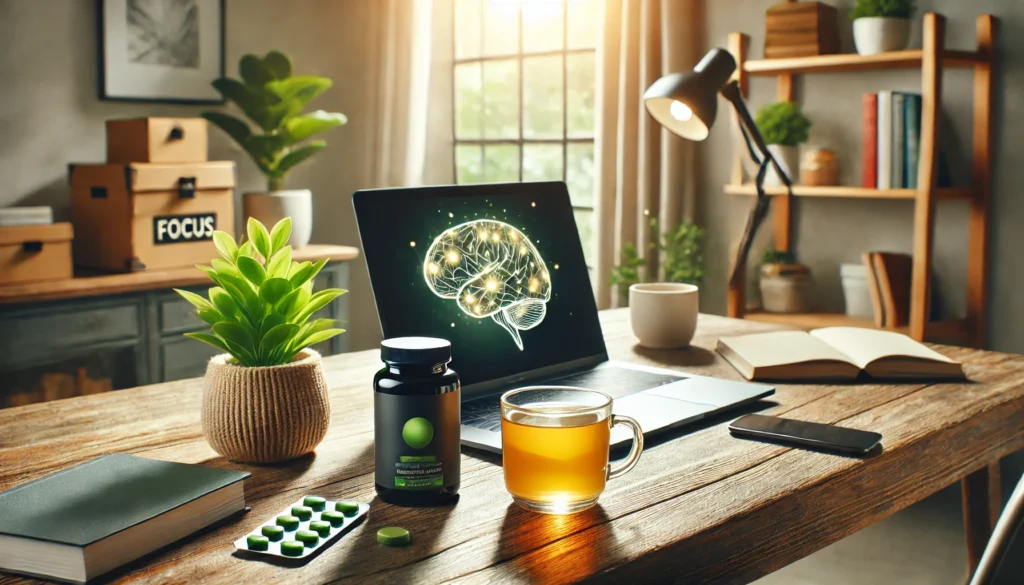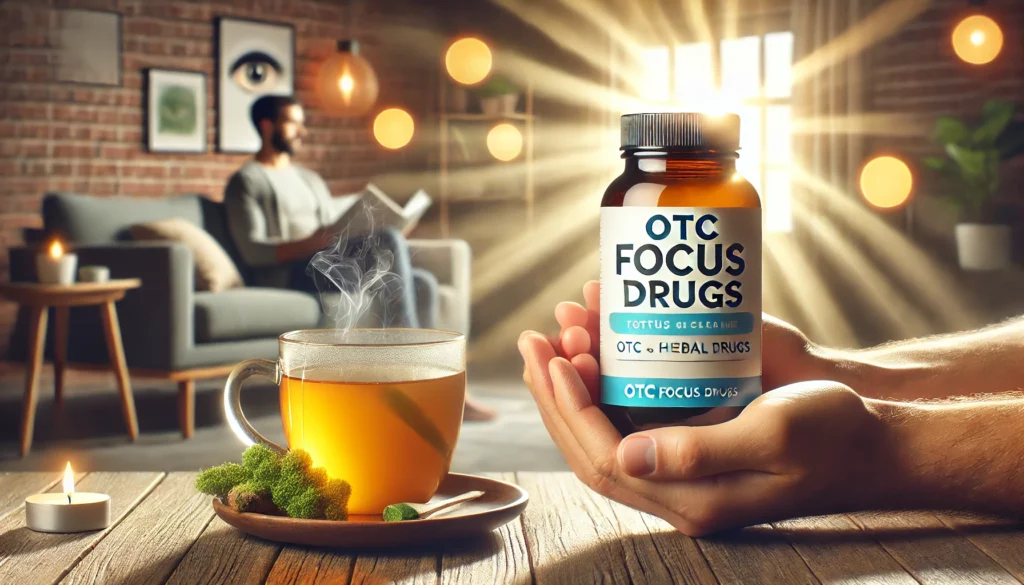In today’s fast-paced world, the demand for improved concentration and mental clarity has never been higher. Whether it’s students preparing for exams, professionals aiming to enhance productivity, or individuals seeking to boost their cognitive performance, the quest for the perfect focus aid is universal. Over-the-counter (OTC) focus drugs have emerged as a popular solution, offering an accessible alternative to prescription medications. This guide will delve into the world of OTC focus drugs, exploring their benefits, limitations, and the science behind their efficacy.
You may also like: Top Memory Supplements to Combat Dementia
The Rise of OTC Focus Drugs
Historical Context and Evolution
The concept of cognitive enhancement is not new; for centuries, humans have sought ways to improve mental function. Historically, focus-enhancing drugs were primarily the domain of prescription medications, especially those used to treat conditions like ADHD. However, as the demand for cognitive enhancers grew, the market for OTC focus drugs began to expand significantly. This shift was driven by an increased awareness of mental health and wellness, along with a desire for accessible solutions.
Market Growth and Accessibility
The modern lifestyle’s demands have propelled the need for cognitive enhancers that are both effective and readily available. This demand has led to a surge in the production and availability of OTC focus drugs. These medications are now easily accessible in various forms, including pills, powders, and beverages, catering to a wide audience. They offer a legal and often safer alternative to prescription drugs for individuals seeking a cognitive boost without the need for a doctor’s visit.
Diverse Consumer Needs
The appeal of OTC focus drugs spans a diverse consumer base. Students, professionals, and even older adults are turning to these products to meet specific needs. Whether it’s enhancing memory, increasing alertness, or managing stress, OTC focus drugs promise a solution for various cognitive challenges. This broad appeal has contributed to their rising popularity and acceptance in mainstream society.
Key Ingredients in OTC Focus Drugs
Caffeine: The Classic Stimulant
Mechanism of Action
One of the most common ingredients in OTC focus medications is caffeine. Known for its ability to enhance alertness and reduce the perception of fatigue, caffeine works by blocking adenosine receptors in the brain, which are responsible for promoting sleep. This action results in increased alertness and wakefulness, making caffeine a staple in many focus-enhancing products.
Balancing Benefits and Side Effects
However, it’s important to note that excessive caffeine intake can lead to side effects such as jitters, anxiety, and disrupted sleep patterns. Moderation is key when relying on caffeine for cognitive enhancement. Understanding personal tolerance levels and adjusting intake accordingly can help mitigate these adverse effects.
Combining Caffeine with Other Ingredients
Many OTC focus drugs combine caffeine with other ingredients to enhance its effects while minimizing side effects. For instance, pairing caffeine with L-theanine, an amino acid found in tea leaves, can promote a state of relaxed alertness, reducing jitteriness and enhancing focus.
Ginkgo Biloba: The Ancient Remedy
Traditional Uses and Modern Applications
Ginkgo biloba, derived from one of the oldest tree species on Earth, has been used for centuries in traditional medicine. It is believed to improve blood flow to the brain, thereby enhancing cognitive function and memory. While scientific evidence supporting its efficacy is mixed, its historical use and anecdotal reports highlight its potential benefits.
Scientific Evidence and Debates
The scientific community continues to explore Ginkgo biloba’s cognitive benefits. Some studies suggest improvements in memory and cognitive function, particularly in older adults. However, other research findings are inconclusive, leading to ongoing debates about its effectiveness.
Practical Considerations
When considering Ginkgo biloba as a focus enhancer, it’s essential to be aware of its potential interactions with other medications. Consulting with a healthcare professional can help ensure safe and effective use, especially for individuals with pre-existing health conditions.
L-Theanine: The Calming Companion
Mechanism and Effects
L-theanine, an amino acid found in tea leaves, is known for its calming effects. It promotes relaxation without drowsiness, making it an ideal component in focus-enhancing formulations. When combined with caffeine, L-theanine can help mitigate the jittery side effects while promoting a state of relaxed alertness.
Benefits in Stressful Situations
In addition to enhancing focus, L-theanine is beneficial in managing stress and anxiety. Its calming properties can improve concentration and mental clarity, particularly in high-pressure situations such as exams or important work presentations.
Optimal Dosage and Combinations
Understanding the optimal dosage of L-theanine is crucial for maximizing its benefits. Many OTC focus formulations include a balanced combination of L-theanine and caffeine, allowing users to experience enhanced focus and calmness simultaneously.

Bacopa Monnieri: The Cognitive Booster
Traditional and Modern Uses
Bacopa monnieri is an herb traditionally used in Ayurvedic medicine for its cognitive-enhancing properties. It is believed to improve memory and reduce anxiety, making it a valuable addition to focus-enhancing supplements. Its use spans centuries, with modern research supporting its potential benefits.
Research Findings and Implications
Research suggests that Bacopa monnieri may enhance cognitive function, particularly in older adults. Studies indicate improvements in memory, attention, and information processing, highlighting its promise as a cognitive booster. However, more research is needed to fully understand its mechanisms and long-term effects.
Considerations for Use
When incorporating Bacopa monnieri into a cognitive enhancement regimen, it’s essential to consider individual health factors and potential interactions with other supplements or medications. Consulting with a healthcare provider can ensure safe and effective use.
The Science Behind Focus Enhancement
Neurotransmitter Modulation
The efficacy of OTC focus drugs hinges on their ability to modulate neurotransmitter activity in the brain. Neurotransmitters like dopamine, norepinephrine, and acetylcholine play crucial roles in attention, focus, and memory. By influencing these neurotransmitters, OTC focus drugs can enhance cognitive function.
Caffeine and Dopamine
For example, caffeine increases dopamine levels, leading to improved mood and motivation. This effect can enhance focus and concentration, making caffeine a popular choice in focus-enhancing products. Understanding the role of dopamine in cognitive processes is crucial for appreciating caffeine’s benefits.
Ginkgo Biloba and Acetylcholine
Similarly, Ginkgo biloba may boost acetylcholine levels, enhancing memory and learning. Acetylcholine is a key neurotransmitter involved in memory formation and retention, and its modulation can contribute to improved cognitive performance. Exploring the interactions between Ginkgo biloba and acetylcholine provides insights into its potential benefits.
Limitations and Considerations
Tolerance and Dependency
Understanding Tolerance
Regular use of certain OTC focus drugs, particularly those containing caffeine, can lead to tolerance. This means that over time, higher doses may be required to achieve the same effects, increasing the risk of side effects. Recognizing the signs of tolerance is essential for maintaining safe usage.
Risk of Dependency
Dependency is another concern, especially with stimulant-based focus drugs. Over-reliance can lead to withdrawal symptoms and reduced effectiveness, emphasizing the need for mindful and moderate use. Strategies such as cycling usage can help prevent dependency.
Managing Tolerance and Dependency
To manage tolerance and dependency, it’s advisable to take regular breaks from using focus drugs. This practice, known as cycling, allows the body to reset and maintain sensitivity to the drugs’ effects. Consulting with a healthcare professional can provide personalized guidance for managing tolerance and dependency.
Individual Variability
Genetic Factors
The effectiveness of OTC focus drugs can vary significantly from person to person. Genetic factors play a role in how individuals metabolize and respond to these medications. Understanding personal genetic predispositions can inform usage and dosage decisions.
Health and Lifestyle Influences
Overall health and lifestyle factors also impact the effectiveness of focus drugs. Diet, exercise, and sleep quality can influence how the body responds to cognitive enhancers. Maintaining a healthy lifestyle can enhance the benefits of focus drugs and minimize side effects.
Monitoring and Adjusting Usage
It’s crucial to monitor your body’s response to OTC focus drugs and adjust usage accordingly. Keeping a journal of experiences and effects can provide valuable insights into what works best for you. This personalized approach ensures safe and effective use.

Interaction with Other Medications
Potential Interactions
If you’re taking other medications or have pre-existing health conditions, it’s essential to consult with a healthcare professional before using OTC focus drugs. Some ingredients may interact with other drugs, leading to adverse effects. Being aware of potential interactions can prevent complications.
Consulting Healthcare Professionals
Consulting with a healthcare provider can provide personalized advice on using focus drugs safely. They can assess potential interactions and recommend appropriate dosages based on individual health factors. This proactive approach ensures safe and effective use.
Safe Usage Practices
Practicing safe usage involves understanding potential interactions and being proactive in consulting healthcare professionals. Maintaining open communication with your healthcare provider can help navigate any challenges and ensure optimal cognitive enhancement.
Future Implications and Trends
Advances in Nootropics
The field of cognitive enhancement is rapidly evolving, with ongoing research exploring new possibilities. Nootropics, substances that enhance cognitive function, are gaining popularity and are often included in OTC focus formulations. As science advances, we can expect more targeted and effective options for cognitive enhancement.
Integration of Technology
Additionally, the integration of technology and cognitive enhancement is on the horizon. Wearable devices and neurofeedback tools may soon complement OTC focus drugs, offering a holistic approach to cognitive optimization. These technologies could provide real-time feedback and personalized recommendations for enhancing focus and mental clarity.
Ethical Considerations
As cognitive enhancement technologies and substances evolve, ethical considerations will become increasingly important. Issues such as accessibility, fairness, and long-term effects will need to be addressed to ensure responsible use. Engaging in ongoing discussions about the ethical implications of cognitive enhancement is crucial for shaping its future.
Practical Advice for Using OTC Focus Drugs
Start Low and Go Slow
Begin with the lowest effective dose and gradually increase if needed. Monitoring how your body responds to different dosages can help determine the optimal amount for your needs. This cautious approach minimizes the risk of side effects and ensures safe use.
Combine with Healthy Habits
Focus drugs are most effective when complemented by a healthy lifestyle. Prioritize adequate sleep, a balanced diet, and regular exercise to support cognitive function. These habits can enhance the benefits of focus drugs and contribute to overall mental well-being.
Be Mindful of Timing
Consider the timing of consumption to avoid interference with sleep. Avoid taking focus drugs late in the day, especially those containing caffeine, as this can disrupt sleep patterns. Planning your intake strategically can maximize benefits and minimize disruptions.
Cycle Usage
To prevent tolerance, consider cycling your usage. Taking breaks from focus drugs allows your body to reset and maintain sensitivity to their effects. Establishing a regular cycle can help prevent dependency and ensure long-term effectiveness.

Conclusion
OTC focus drugs offer a viable solution for individuals seeking enhanced concentration and mental clarity. With a variety of ingredients and formulations available, it’s possible to find an option that suits your needs. However, it’s crucial to approach their use with awareness and caution, considering individual variability and potential side effects. By combining OTC focus drugs with healthy habits and staying informed about future trends, you can optimize your cognitive performance and achieve your goals.
Remember, while OTC focus drugs can provide a cognitive boost, they are just one piece of the puzzle. A holistic approach to mental wellness, incorporating lifestyle changes and mindfulness, remains essential for long-term success. By embracing a balanced strategy, you can enhance your cognitive abilities and thrive in today’s demanding world.
Further Reading:
Can Prevagen Improve Memory? Uses, Side Effects, and More
7 Best Cognitive Enhancers For ADHD
Don’t buy into brain health supplements
Important Note: The information contained in this article is for general informational purposes only, and should not be construed as health or medical advice, nor is it intended to diagnose, prevent, treat, or cure any disease or health condition. Before embarking on any diet, fitness regimen, or program of nutritional supplementation, it is advisable to consult your healthcare professional in order to determine its safety and probable efficacy in terms of your individual state of health.
Regarding Nutritional Supplements Or Other Non-Prescription Health Products: If any nutritional supplements or other non-prescription health products are mentioned in the foregoing article, any claims or statements made about them have not been evaluated by the U.S. Food and Drug Administration, and such nutritional supplements or other health products are not intended to diagnose, treat, cure, or prevent any disease.


